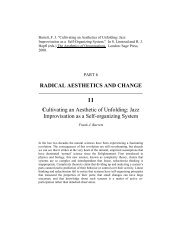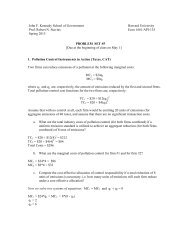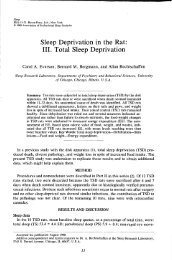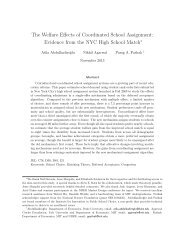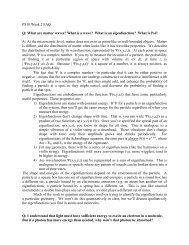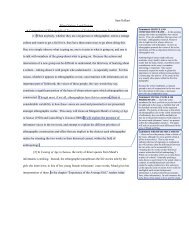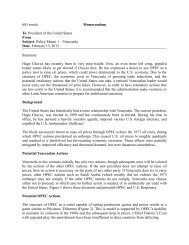mental health- counseling-1.pdf - iSites - Harvard University
mental health- counseling-1.pdf - iSites - Harvard University
mental health- counseling-1.pdf - iSites - Harvard University
Create successful ePaper yourself
Turn your PDF publications into a flip-book with our unique Google optimized e-Paper software.
NASPA Journal, Vol. 41, no. 1, Fall 2003<br />
representatives from each of these units to discuss problems, especially<br />
serious <strong>mental</strong> <strong>health</strong> concerns, ensure that all parties are aware of<br />
emergent situations and can participate in decision-making and formulate<br />
appropriate treatment and action plans. Furthermore, this<br />
model reinforces the philosophy that student <strong>mental</strong> <strong>health</strong> issues<br />
should be a shared concern and responsibility within the institution.<br />
Conclusion<br />
Universities and colleges are dealing with substantial challenges posed<br />
by the changing <strong>mental</strong> <strong>health</strong> needs of today’s college students. It is<br />
important for administrators, faculty, and staff to understand the profound<br />
impact that <strong>mental</strong> <strong>health</strong> problems can have on all aspects of<br />
campus life, and to treat <strong>mental</strong> <strong>health</strong> issues as an institutional<br />
responsibility and priority. Counseling centers can respond effectively<br />
to the current challenges if they have the support and commitment of<br />
the administration; and if they take steps to balance the demand for<br />
services with existing resources by reviewing priorities, establishing<br />
appropriate limits, employing innovative strategies, and practicing<br />
good self-care to minimize stress and burnout. The need for <strong>counseling</strong><br />
centers has never been greater. They will continue to play an<br />
important role in supporting the mission of higher education institutions<br />
by providing <strong>counseling</strong> for students who are experiencing problems<br />
and assisting them in achieving their educational and personal<br />
goals.<br />
References<br />
American Psychiatric Association. (1994). Diagnostic and statistical<br />
manual of <strong>mental</strong> disorders (4th ed.). Washington, DC: Author.<br />
American Psychological Association (APA). (1992). Ethical principles<br />
of psychologists and code of conduct. Washington, DC: APA.<br />
Anderson. (1985). Forces influencing student persistence and<br />
achievement. In L. Noel, R. Levitz, & D. Saluri (Eds.), Increasing student<br />
retention (pp.44–63). San Francisco: Jossey Bass.<br />
Archer, J., & Cooper, S. (1998). Counseling and <strong>mental</strong> <strong>health</strong> services<br />
on campus: A handbook of contemporary practices and challenges.<br />
San Francisco: Jossey Bass.<br />
178



